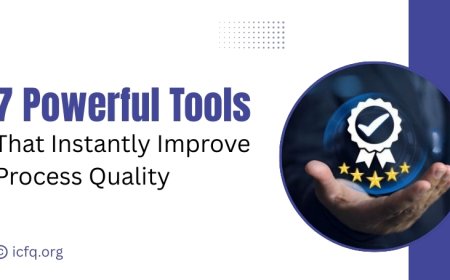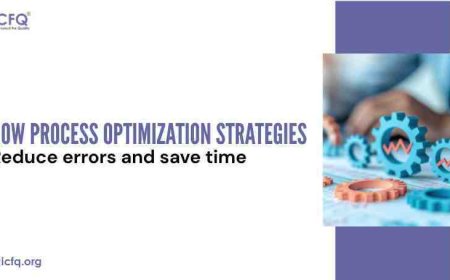Six Sigma Courses for Process Improvement Professionals
Explore our Six Sigma courses for process improvement professionals. Enhance your skills, improve efficiency, and get certified with our expert-led training.

Six Sigma Courses help people who want to make processes better. These courses teach a lot about making things more efficient, reducing waste, and making quality better in a company. They offer different kinds of training and certifications, like Six Sigma Certification and Six Sigma Training. There are also online courses for people who prefer learning on the internet. There are different levels of Six Sigma Courses. There's the Green Belt, Black Belt, and Yellow Belt. These courses help people at different points in their Six Sigma journey. For those who want to become experts, there's the Master Black Belt. This course teaches a lot about Six Sigma methods and how to lead teams to make big changes in a company.
Six Sigma Courses teach people how to find problems in processes and fix them using data. Whether someone wants to take classes in person or online, they can learn a lot from these courses. By taking Six Sigma Courses, people can become leaders in making projects better and keep finding ways to make things even better in a company.
The Rising Demand for Process Improvement: The Role of Six Sigma Courses
Businesses are all about making things run smoother and better. They want to do things faster, cheaper, and with fewer mistakes. That's where Six Sigma courses come in. They teach people how to find problems in processes and fix them, making everything work more efficiently. Six Sigma is like a set of tools for making things better. It helps you find where things are going wrong and how to make them right. People who learn Six Sigma can help their companies save money, get more done, and make customers happier.
One popular course is the Yellow Belt Training. It's like the first step into the world of Six Sigma. In this course, people learn the basics of Six Sigma and how to start using it to improve processes in their company. What's great about Six Sigma courses is that they're not hard to find. Many companies and schools offer them, and some are even free. This means that anyone who wants to learn about Six Sigma can do it, no matter their budget.
Six Sigma follows a step-by-step approach called DMAIC: Define, Measure, Analyze, Improve, and Control. It's like a roadmap for fixing things. This method helps ensure that the changes made are long-lasting and helps the company reach its goals. As more and more companies realize the benefits of Six Sigma, the demand for people who know how to use it is growing. That's why getting certified in Six Sigma is becoming important for both individuals and companies.
Challenges of Improving Processes Without Six Sigma Training
Making things run smoother and better is a big goal. But doing that can be tough if you don't know about Six Sigma courses. Let's talk about why.
1. Limited Help: If you don't have Six Sigma training, you're missing out on a bunch of helpful tools and ways to fix problems. Six Sigma gives you a step-by-step plan (called DMAIC) to find and solve problems smartly. Without it, it's harder to figure out what's wrong and how to make it better.
2. Hard to Find Problems: Without Six Sigma, figuring out exactly what's causing issues in your processes is tricky. You might waste time trying things that don't work because you don't understand the real problem.
3. Guessing Instead of Knowing: Six Sigma is all about using facts and numbers to make decisions. Without it, you might just guess at what's wrong instead of using data to know for sure. That can lead to bad choices and missed chances to make things right.
4. People Don't Like Change: Making things better often means changing how things are done. But without Six Sigma, it's tough to get everyone on board with those changes. People might not understand why things need to change or how it'll help.
5. Wasting Time and Money: Without Six Sigma, you might spend resources in the wrong places. You could end up fixing things that don't matter much while ignoring the stuff that needs help. That's not good for business.
6. Can't Keep Getting Better: Fixing problems isn't a one-time thing. You need to keep making things better over time. Six Sigma helps with that by giving you ways to keep an eye on things and make sure improvements stick around. Without it, you might end up back where you started.
without Six Sigma courses, improving processes is a lot harder. But by learning from Six Sigma, businesses can get the tools they need to face these challenges head-on and keep getting better at what they do.

Do Process Improvement Pros Need Six Sigma Training?
Yes, Six Sigma courses are important for folks who work on making processes better. They teach you everything you need to know about how to make things run smoother and with fewer mistakes. With Six Sigma training, you learn how to find problems, analyze data, and fix things so they work better. Plus, getting certified in Six Sigma makes you look good to employers and can help you find better jobs. In today's competitive job market, having Six Sigma skills can give you an edge and help you make a big difference in your company.
Six Sigma Courses for Improving Processes
Companies always want to make things better, faster, and cheaper. That's where Six Sigma courses come in. These courses are super important for people who work on making processes better. Let's take a look at why they're so crucial and what options you have if you want to learn about Six Sigma.
1. Understanding Six Sigma: Six Sigma is a way of working that uses data to make things almost perfect. These courses teach you all about it - how it works, what tools to use, and how to lead projects to make things better.
2. Getting Certified: Six Sigma has different levels of certification, like Yellow Belt and Master Black Belt. These certifications show that you know your stuff when it comes to Six Sigma. Employers like seeing these certifications on your resume.
3. Putting It into Practice: These courses aren't just about learning theory. You'll also get to work on real-life problems. By looking at case studies, doing simulations, and working on projects, you'll learn how to spot problems, analyze data, and fix things.
4. Making Things Better, Always: Six Sigma isn't just a one-time thing. It's all about always finding ways to make things better. These courses help you develop a mindset where you're always looking for ways to improve.
5. Boosting Your Career: Knowing Six Sigma can boost your career. Whether you want to move up in your current job or find a new one, having Six Sigma certification shows that you're serious about making things better.
6. Learning Your Way: Thanks to the internet, you can learn Six Sigma in lots of different ways. You can go at your own pace with online modules or join virtual classrooms where you can interact with others.
If you're someone who works on improving processes, taking Six Sigma courses is a must. They give you the knowledge and skills you need to make things work better, and they can open up lots of new opportunities for you. Check out the Six Sigma courses on the icfq website to find the right fit for you!
Six Sigma courses are super useful for folks who want to improve how things work and make their company great. These courses teach you a bunch of methods and give you serious training to find where things are going wrong, fix them up, and make everything run smoother. They help you spot mistakes, cut them down, and boost your business's overall performance. With Six Sigma training, you learn how to look at data, make smart changes, and keep on getting better and better. So, if you want to be a real game-changer in your industry and keep up with the competition, investing in Six Sigma education is a smart move.




























